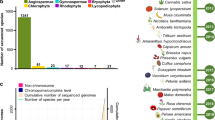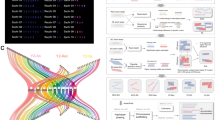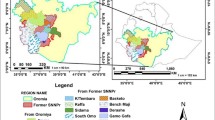Abstract
Sugarcane generates the vast majority of sugar consumed worldwide. The large-scale development of EST-SSR markers are crucial for the analysis of genetic mechanisms important in agronomic traits of sugarcane. In this study, based on published 107,598 full-length expressed sequence tags (ESTs) from 22 sugarcane cultivars, we identified a total of 46,043 loci of simple repeat sequences. The SSRs with di-nucleotide (8175 loci) and tri-nucleotide (10,709 loci) repeat motifs account for 40.96% (18,884) of the total SSR loci, with (AT/TA)n and (ACA/TGT)n being found to be the major repeat motifs. A total of 1070 pairs of primers were randomly selected to verify using 12 accessions including S. officinarum, S. robustum, S. spontaneum and cultivars. The results showed that 847 (79.1%) were successfully amplified, of which 349 (32.60%) were polymorphic in the analyzed samples. The polymorphic rates of EST-SSR markers with di-nucleotide, tri-nucleotide, tetra-nucleotide, penta-nucleotide and hexa-nucleotide repeat motifs were 36.82% (81), 49.40% (165), 43.04% (34), 30.19% (32) and 34.26% (37), respectively. Among them, the EST-SSRs comprising five types of repeat motifs (CA)n, (CCG)n, (CCGC)n, (CGGCG)n and (GCCGGC)n presented high degrees of polymorphism. Finally, 20 EST-SSR markers with polymorphisms were selected to perform a cluster analysis of 48 accessions from Saccharum and Erianthus genera. These results demonstrated that Chinese sugarcane cultivars from group IV (25/39) had a lower genetic divergence than cultivars from other countries and EST-SSR markers can also be used in determining the genetic diversity of Erianthus genus. This set of EST-SSR markers is an important molecular resource for analyzing genetic diversity, molecular fingerprinting and genetic mapping.



Similar content being viewed by others
References
Aitken KS, Jackson PA, McIntyre CL (2005) A combination of AFLP and SSR markers provides extensive map coverage and identification of homo(eo)logous linkage groups in a sugarcane cultivar. Theor Appl Genet 110:789–801. https://doi.org/10.1007/s00122-004-1813-7
Ali A, Jin-Da W, Yong-Bao P, Zu-Hu D, Zhi-Wei C, Ru-Kai C, San-Ji G (2017) Molecular identification and genetic diversity analysis of Chinese sugarcane (Saccharum spp. hybrids) varieties using SSR markers. Trop Plant Biol 10:194–203. https://doi.org/10.1007/s12042-017-9195-6
Bajgain P, Rouse M, Anderson JA (2015) Comparing genotyping-by-sequencing and single nucleotide polymorphism Chip genotyping for quantitative trait loci mapping in wheat. Crop Sci 56:232–248. https://doi.org/10.2135/cropsci2015.06.0389
Blanca J, Cañizares J, Roig C, Ziarsolo P, Nuez F, Picó B (2011) Transcriptome characterization and high throughput SSRs and SNPs discovery in Cucurbita pepo (Cucurbitaceae). BMC Genomics 12:104–104. https://doi.org/10.1186/1471-2164-12-104
Bushman BS, Larson SR, Mott IW, Cliften PF, Wang RC, Chatterton NJ, Hernandez AG, Ali S, Kim RW, Thimmapuram J (2008) Development and annotation of perennial Triticeae ESTs and SSR markers. Genome 51:779–788
Cai C, Yang Y, Cheng L, Tong C, Feng J (2015) Development and assessment of EST-SSR marker for the genetic diversity among tobaccos (Nicotiana tabacum L.). Russ J Genet 51:591–600
Cordeiro GM, Casu R, McIntyre CL, Manners JM, Henry RJ (2001) Microsatellite markers from sugarcane (Saccharum spp.) ESTs cross transferable to erianthus and sorghum. Plant Sci 160:1115–1123
Cordeiro GM, Pan Y-B, Henry RJ (2003) Sugarcane microsatellites for the assessment of genetic diversity in sugarcane germplasm. Plant Sci 165:181–189. https://doi.org/10.1016/S0168-9452(03)00157-2
D'Hont A, Grivet L, Feldmann P, Glaszmann JC, Rao S, Berding N (1996) Characterisation of the double genome structure of modern sugarcane cultivars (Saccharum spp.) by molecular cytogenetics. Mol Gen Genet 250:405–413. https://doi.org/10.1007/bf02174028
Fernandez-Silva I, Eduardo I, Blanca J, Esteras C, Picó B, Nuez F, Arús P, Garcia-Mas J, Monforte AJ (2008) Bin mapping of genomic and EST-derived SSRs in melon (Cucumis melo L.). Theor Appl Genet 118:139–150. https://doi.org/10.1007/s00122-008-0883-3
Gupta PK, Rustgi S, Sharma S, Singh R, Kumar N, Balyan HS (2003) Transferable EST-SSR markers for the study of polymorphism and genetic diversity in bread wheat. Mol Gen Genet 270:315–323. https://doi.org/10.1007/s00438-003-0921-4
Haq SU, Kumar P, Singh RK, Verma KS, Bhatt R, Sharma M, Kachhwaha S, Kothari SL (2016) Assessment of func-tional EST-SSR markers (Sugarcane) in cross-species trans-ferability, genetic diversity among Poaceae plants, and bulk segregation analysis. Genet Res Int 2016. https://doi.org/10.1155/2016/7052323
Hoang NV, Furtado A, Mason PJ, Marquardt A, Kasirajan L, Thirug PP, Botha FC, Henry RJ (2017) A survey of the complex transcriptome from the highly polyploid sugarcane genome using full-length isoform sequencing and de novo assembly from short read sequencing. BMC Genomics 18:395–417. https://doi.org/10.1186/s12864-017-3757-8
Hoarau JY, Offmann B, D’Hont A, Risterucci AM, Roques D, Glaszmann JC, Grivet L (2001) Genetic dissection of a modern sugarcane cultivar (Saccharum spp.). I. Genome mapping with AFLP markers. Theor Appl Genet 103:84–97. https://doi.org/10.1007/s0012200003907
Hwang JH, Ahn SG, Oh JY, Choi YW, Kang JS, Park YH (2011) Functional characterization of watermelon (Citrullus lanatus L.) EST–SSR by gel electrophoresis and high resolution melting analysis. Sci Hortic 130:715–724. https://doi.org/10.1016/j.scienta.2011.08.014
Islam MS, Yang X, Sood S, Comstock JC, Zan F, Wang J (2018) Molecular dissection of sugar related traits and it’s attributes in Saccharum spp. hybrids. Euphytica 214:206–214. https://doi.org/10.1007/s10681-018-2252-x
Kantety RV, La Rota M, Matthews DE, Sorrells ME (2002) Data mining for simple sequence repeats in expressed sequence tags from barley, maize, rice, sorghum and wheat. Plant Mol Biol 48:501–510. https://doi.org/10.1023/A:1014875206165
Kole C (2007) Pulses, sugar and tuber crops. Springer, Berlin Heidelberg
Lawson MJ, Zhang L (2006) Distinct patterns of SSR distribution in the Arabidopsis thaliana and rice genomes. Genome Biol 7:58–79. https://doi.org/10.1186/gb-2006-7-2-r14
Li YC, Korol AB, Fahima T, Nevo E (2004) Microsatellites within genes: structure, function, and evolution. Mol Biol Evol 21:991–1007. https://doi.org/10.1093/molbev/msh073
Li M, Yuyama N, Luo L, Hirata M, Cai H (2009) In silico mapping of 1758 new SSR markers developed from public genomic sequences for sorghum. Mol Breed 24:41–47. https://doi.org/10.1007/s11032-009-9270-2
Lopez Y, Kurashev A, Chase C, Gallo M, Sollenberger L, Altpeter F, Wang J (2018) Developing and validating microsatellite markers in elephant grass (Pennisetum purpureum S.). Euphytica 214:158–171. https://doi.org/10.1007/s10681-018-2256-6
Lü JH, Hu JJ, Lu M-Z (2012) AFLP molecular marker of Salix spp. based on apillary electrophoresis. J Beijing For Univ 9:51–57. https://doi.org/10.1038/s41598-018-36630-7
McCouch S, Temnykh S, Lukashova A, Coburn J, DeClerck G, Cartinhour S, Harrington S, Thomson M, Septiningsih E, Semon M, Moncada P, Li J (2008) Microsatellite markers in rice: abundance, diversity, and applications. In pp:117–135. https://doi.org/10.1142/9789812814296_0008
Miah G, Rafii MY, Ismail MR, Puteh AB, Rahim HA, Islam Kh N, Latif MA (2013) A review of microsatellite markers and their applications in rice breeding programs to improve blast disease resistance. Int J Mol Sci 14:22499–22528. https://doi.org/10.3390/ijms141122499
Morgante M, Hanafey M, Powell W (2002) Microsatellites are preferentially associated with nonrepetitive DNA in plant genomes. Nature genetics 30:194–200. https://doi.org/10.1038/ng822
Oliveira KM, Pinto LR, Marconi TG, Molinari M, Ulpian EC, Chabregas SM, Falco MC, Burnquist W, Garcia AA, Souza AP (2009) Characterization of new polymorphic functional markers for sugarcane. Genome 52:191–209. https://doi.org/10.1139/g08-105
Parthiban S, Govindaraj P, Senthilkumar S (2018) Comparison of relative efficiency of genomic SSR and EST-SSR markers in estimating genetic diversity in sugarcane. 3 biotech 8:144-158. https://doi.org/10.1007/s13205-018-1172-8
Rohlf F (2000) NTSYS-pc: microcomputer programs for numerical taxonomy and multivariate analysis system, version 2.1The American statistician 41:330. https://doi.org/10.2307/2684761
Saha MC, Mian MAR, Eujayl I, Zwonitzer JC, Wang L, May GD (2004) Tall fescue EST-SSR markers with transferability across several grass species. Theor Appl Genet 109:783–791. https://doi.org/10.1007/s00122-004-1681-1
Selvi A, Nair N, Noyer J, Singh N, Balasundaram N, Bansal K, Koundal K, Mohapatra T (2011) Genomic constitution and genetic relationship among the tropical and subtropical Indian sugarcane cultivars revealed by AFLP. Crop Sci 45:1750–1757
Singh RK, Singh RB, Singh SP, Sharma ML (2011) Identification of sugarcane microsatellites associated to sugar content in sugarcane and transferability to other cereal genomes. Euphytica 182:335–354. https://doi.org/10.1007/s10681-011-0484-0
Singh RK, Jena SN, Khan S, Yadav S, Banarjee N, Raghuvanshi S, Bhardwaj V, Dattamajumder SK, Kapur R, Solomon S, Swapna M, Srivastava S, Tyagi AK (2013) Development, cross-species/genera transferability of novel EST-SSR markers and their utility in revealing population structure and genetic diversity in sugarcane. Gene 524:309–329. https://doi.org/10.1016/j.gene.2013.03.125
Tang J, Baldwin S, Jacobs JM, Linden C, Voorrips RE, Leunissen JA, van Eck H, Vosman B (2008) Large-scale identification of polymorphic microsatellites using an in silico approach. BMC Bioinformatics 9:374–374. https://doi.org/10.1186/1471-2105-9-374
Ukoskit K (2012) Novel expressed sequence tag- simple sequence repeats (EST-SSR) markers characterized by new bioinformatic criteria reveal high genetic similarity in sugarcane (Saccharum spp.) breeding lines. Afr J Biotechnol 11:1337–1363
Wang Z, Li J, Luo Z, Huang L, Chen X, Fang B, Li Y, Chen J, Zhang X (2011) Characterization and development of EST-derived SSR markers in cultivated sweetpotato (Ipomoea batatas). BMC Plant Biol 11:139–139. https://doi.org/10.1186/1471-2229-11-139
Wang Y, Yang C, Jin Q, Zhou D, Wang S, Yu Y, Yang L (2015) Genome-wide distribution comparative and composition analysis of the SSRs in Poaceae. BMC Genet 16:18–26. https://doi.org/10.1186/s12863-015-0178-z
Wei W, Qi X, Wang L, Zhang Y, Hua W, Li D, Lv H, Zhang X (2011) Characterization of the sesame (Sesamum indicum L.) global transcriptome using Illumina paired-end sequencing and development of EST-SSR markers. BMC Genomics 12:451–451. https://doi.org/10.1186/1471-2164-12-451
Wu HB, Gong H, Liu P, He XL, Luo SB, Zheng XM, Zhang CY, He XM, Luo J (2014) Large-scale development of EST-SSR markers in sponge gourd via transcriptome sequencing. Mol Breed 34:1903–1915. https://doi.org/10.1007/s11032-014-0148-6
Zhang J, Nagai C, Yu Q, Pan YB, Ayala-Silva T, Schnell RJ, Comstock JC, Arumuganathan AK, Ming R (2012) Genome size variation in three Saccharum species. Euphytica 185:511–519. https://doi.org/10.1007/s10681-012-0664-6
Zhang J et al (2018) Allele-defined genome of the autopolyploid sugarcane Saccharum spontaneum L. Nat Genet 50:1565–1573. https://doi.org/10.1038/s41588-018-0237-2
Acknowledgements
This project was supported by the Science and Technology Planting Project of Guangdong Province (2019B020238001), NSFC (31201260, 31760413 and 31660420), Science and Technology Major Project of Guangxi (AA17202025). The Science and Technology Major Project of Fujian Province [2016NZ0001] and Program for New Century Excellent Talents in Fujian Province [KLa17073A] in China.
Author information
Authors and Affiliations
Contributions
Jisen Zhang and Hengbo Wang designed the experiments. Naiyan Xiao performed the experiments and analyzed the data. Hengbo Wang drafted the manuscript and Jisen Zhang revised critically the paper. Wei Yao, Muqing Zhang, Ray Ming participated in revising the manuscript. All authors read and approved the final article.
Corresponding authors
Ethics declarations
Conflict of Interests
The authors declare no competing financial interests.
Additional information
Communicated by: Hongwei Cai
Publisher’s Note
Springer Nature remains neutral with regard to jurisdictional claims in published maps and institutional affiliations.
Rights and permissions
About this article
Cite this article
Xiao, N., Wang, H., Yao, W. et al. Development and Evaluation of SSR Markers Based on Large Scale Full-Length Transcriptome Sequencing in Sugarcane. Tropical Plant Biol. 13, 343–352 (2020). https://doi.org/10.1007/s12042-020-09260-5
Received:
Accepted:
Published:
Issue Date:
DOI: https://doi.org/10.1007/s12042-020-09260-5




